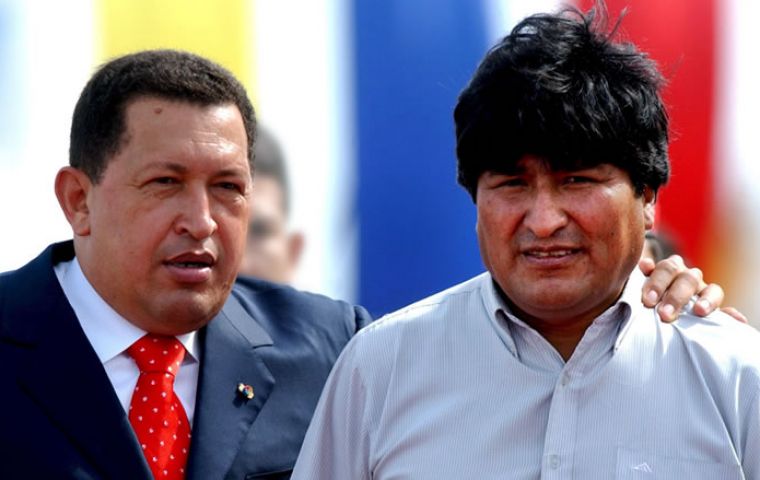MercoPress. South Atlantic News Agency
Morales: Following Chavez or own path?
 Pte. Chavez with Pte. Evo Morales
Pte. Chavez with Pte. Evo Morales Rewrite the constitution: check. Redistribute idle land: check. Rail against U.S. imperialism: check. Nationalize the phone company: check.
The populist agendas of President Evo Morales and his Venezuelan ally Hugo Chavez are strikingly similar, a fact highlighted this week when Morales announced plans to nationalize Bolivia's largest telecommunications company only months after Chavez did the same with Venezuela's. The parallels alarm critics who see Morales following Chavez into an ill-defined socialist future. Yet most of the reforms championed by Morales, Bolivia's first Indian president, spring from Bolivia's own turbulent history. And while its policies are similar, Bolivia â€" poor, largely indigenous, and landlocked â€" may see far different results than oil-rich Venezuela. Morales does not deny Chavez's influence. He flies around Bolivia in military helicopters on loan from the Venezuelan president and implemented last year's gas nationalization with the same U.S. lawyers Chavez uses for his own government takeovers â€" with Chavez footing the bill. Like Chavez, he cites President Fidel Castro of Cuba as a hero. "Comrade Hugo Chavez, son of Comrade Fidel â€" they are the two commanders of the liberating forces of America," he said while welcoming Chavez to Bolivia last month. But to suggest Chavez is the engine of change in Bolivia would be a mistake. The revolution Morales leads was sparked by violent protests in 2000 against U.S.-based Bechtel Corp. for raising rates after taking over the public water utility in Cochabamba, unleashing a deep frustration with Bolivia's failed privatization experiments of the 1990s. "The idea is homegrown," said Jim Shultz, director of the Democracy Center, a Cochabamba-based nonprofit monitoring Bolivian politics. "Whether or not it's being pushed farther or in more directions because Morales is following the model of Venezuela is known only to the backroom conversations between Evo and Hugo." Morales' first 14 months in office read like a condensed version of Chavez's eight years in power. Like the Venezuelan leader, Morales has convened an assembly to rewrite the constitution, pushed to expand his executive powers, triggered an ambitious land reform and consolidated state control over key natural resources and industries. Ecuador could follow a similar path under new President Rafael Correa. After his December election, Correa announced an April 15 vote for a constituent assembly that will rewrite that country's constitution. But in Bolivia, groups backed by the indigenous majority were demanding a new constitution well before Chavez's 1998 election. Their years-old graffiti is still visible on walls in La Paz. Morales' land reform bill, passed in November to expropriate idle and fraudulently obtained tracts for the landless poor, seeks to revive a failed 1952 land reform. And demands to nationalize Bolivia's natural gas were the battle cry in street protests that ousted two recent presidents. By contrast, there has been no native groundswell of support for Morales' plan to re-nationalize former state telecom company Entel, which would reverse what is widely considered the only success story in Bolivia's privatization frenzy a decade ago. In a decade of rapid technological change, Entel's foreign owner Telecom Italia poured more than $600 million into the company, building Bolivia's largest cellular and Internet networks nearly from scratch. Morales, however, lacks the fistfuls of petrodollars Chavez can throw at his own takeover of former state telecom company C.A. Nacional Telefonos de Venezuela, or CANTV, announced in January. Chavez also has political control that has eluded Morales. Venezuela's National Assembly just gave him free rein to rule by decree for 18 months while Morales constantly locks horns with an opposition-controlled Senate and powerful state governors â€" foes who often portray him as a follower of Chavez. "He is converting himself into an echo, into an actor copying the decisions of President Chavez," said Jose Antonio Aruquipa, spokesman for the opposition party Podemos. "Chavez attacks the press; Morales does it too. Chavez moves against the right of private property, and here they announce similar measures." The spread of "Chavismo" can be seen as reversal of the 1990s, when Latin American countries lined up behind a U.S.-backed privatization push that ultimately failed to benefit the region's poor majority. But Bolivia's notoriously impatient electorate â€" the five years before Evo won office saw five different presidents â€" will have final say on Morales' homespun revolution. And Bolivians of all political stripes tend to squirm when Morales calls Chavez "comandante." "Cuba and Castro never could establish a presence here, even with Che (Guevara)," said political analyst Mario Espinoza, referring to the Cuban revolutionary killed in 1967 while trying to spark a communist uprising in Bolivia. "Venezuela is now in fashion, but it's only a fashion." (AP)




Top Comments
Disclaimer & comment rulesCommenting for this story is now closed.
If you have a Facebook account, become a fan and comment on our Facebook Page!